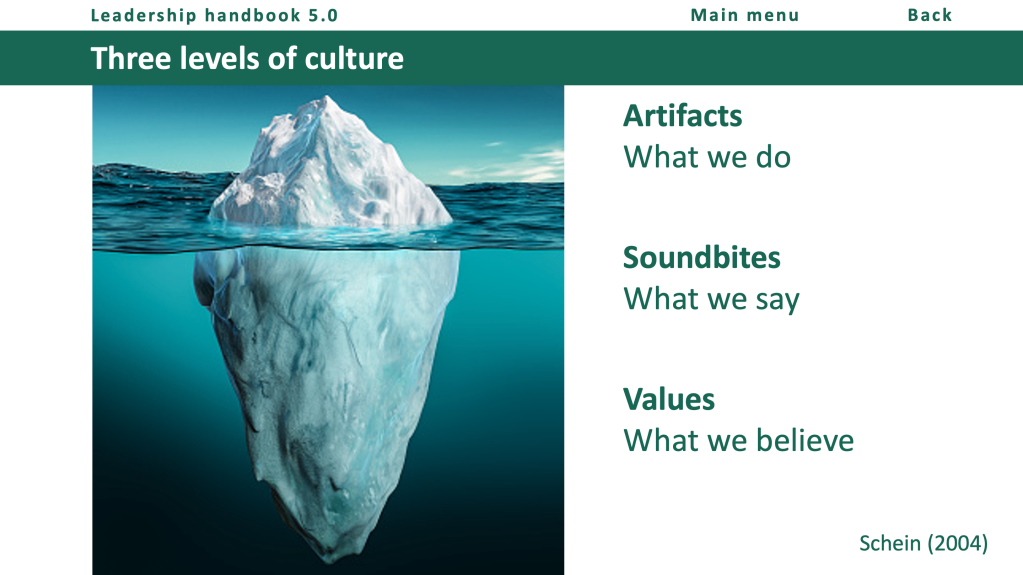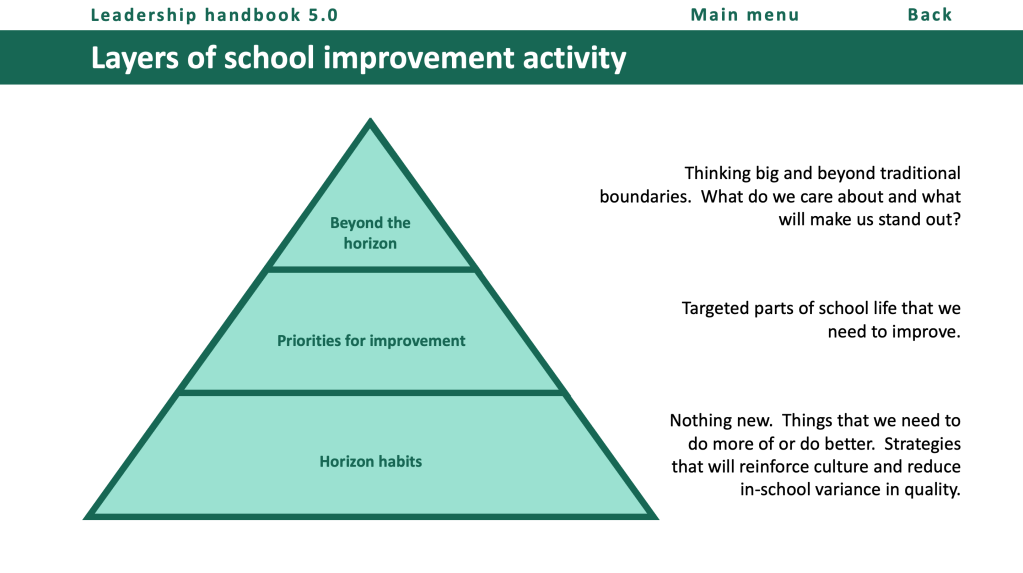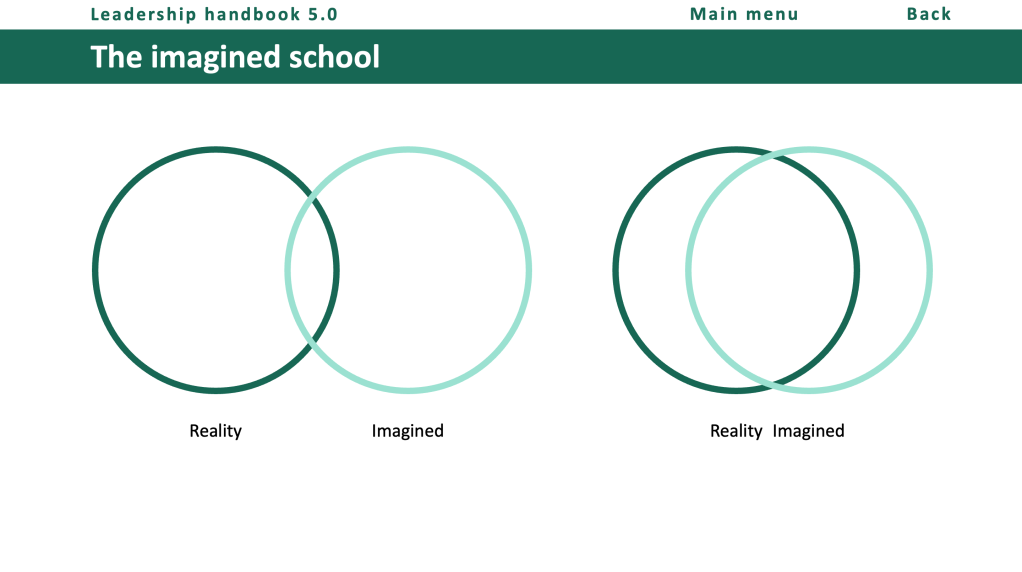I believe three things to be true about school leadership. Schools are complex. School leadership is problem solving. Problem solving requires a great deal of knowledge.
This post is a mental model for school leadership; a way of thinking about the problems that we face as leaders, and the expertise required to solve those problems. 6 questions that leaders need to have robust answers to.
- Strategic intent | What do we value?
- Culture and climate | Who are we?
- Model for school improvement | What do we do?
- Leadership development | How do we get better as leaders?
- CPL | How do we build collective expertise?
- Self evaluation | How do we know how well we’re doing?
Strategic intent | What do we value?
Strategic intent represents objectives for which we cannot plan.
It is a symbol of our purpose and what we value.
Values can be incredibly vague and a bit like horoscopes. They’re all desirable and almost impossible to disagree with. The difference between what are our values? and what do we value? is significant. The former prompts us to name abstract nouns but the latter makes me think differently. Here’s our strategic intent, built around a metaphor of our school name which adds a touch of narrative. We use the horizon as a metaphor for our school improvement work. The horizon is the furthest point that we can see, where the known meets the unknown, but horizons keep moving the closer we get. This is how we think about school improvement: no matter how good our provision, it can always be better.

Culture and climate | Who are we?
School culture is the collection of behaviours and beliefs shared by all.
Although it is the quality of teaching that directly influences outcomes for children, we have a significant influence over the conditions in which colleagues work.
Artifacts are the noticeable, collective behaviours, systems and ways of working. Espoused values are the things that the individuals in the group say are important. The strongest school cultures have alignment between espoused values and artifacts. Underlying assumptions are the thoughts and feelings that are taken for granted by the group. They matter the most in school culture. They dictate how the group behaves and therefore the outcomes achieved by the school, both in terms of what children achieve and what it feels like for colleagues to work there. Because of the importance of underlying assumptions, school leaders need to know what they are, how they spread and and how they take hold so that they can influence them.

Model for school improvement | What do we do?
Spend most of our time on the basics; nothing new, just reducing in school variance.
Spend some of our time on targeted improvement priorities.
Spend a little of our time thinking big, beyond traditional boundaries.
Spending most of our time on reducing in school variance requires immersing ourselves in in our area of responsibility. Simultaneously, we have to accept that the truth doesn’t rise to the top; we are unlikely to see the full reality of school life. Even though we might have excellent test scores and inspection gradings, we must think ‘what if they are not accurate?’ We’re proud of these markers but not satisfied. Reducing in school variance requires structured collaboration; making the most of different learning opportunities to increase the team’s expertise and refine their practice. Timelines, systems and routines keep us focused.
Sometimes, a specific area of school life needs to be improved and this is where we create an action plan to move from how it is now to a future ideal. We describe the future ideal (including but being wary of metrics) and plot a path to get there. Occasionally, there’ll be an opportunity to explore something that goes beyond the traditional realms of what school is for. We should spend a little time pushing boundaries, trynig out new things and seeing where we can stand out against other schools.

Leadership development | How do we get better as leaders?
Schools are complex and school leadership is problem solving.
Complex problem solving requires plenty of domain expertise and adequate ego development.
There can be no improvement without trust.
School leadership is problem solving and most challenges faced by eadership teams are complex, where small actions can have big consequences, where those consequences can be rather unpredictable, where the organisation may tend to organise itself and where its history influences its evolution.
The problems that we are trying solve as school leaders are wicked, where there are no right and wrong solutions, it is hard to know if/when they are actually solved, where they are perceived differently depending on who you ask and there is perennial uncertainty over whether our chosen solution will work.
Expertise is mainly a matter of knowledge and knowledge can be thought of as formal (things that can be codified, recorded and shared) and informal (context specific knowledge). We need to be experts in education by also experts in our school.

CPL | How do we build collective expertise?
Expertise is mainly a matter of knowledge.
Increased teacher expertise is upstream of improved outcomes for chidlren.
Informal learning accounts for most of how teachers develop.
Informal learning is far more prevalent than formal learning. Informal learning can be intentional or unintentional; the former implying that colleagues have some control over the content, pace and direction of their learning and the latter referring to that which is incidental or unplanned, occurring as a byproduct of everyday activities. We learn both on the job whilst teaching or engaged in related work such as planning or assessing children’s work, and beyond workplace boundaries.
Formal and informal learning are neither binary nor dissociated from one another. Instead, they exist on a continuum where formal and informal learning are complementary and mutually reinforcing. We therefore create varied opportunities for structured collaboration to make the most of every opportunity for the team to learn.

Self evaluation | How do we know how well we’re doing?
Truth doesn’t rise to the top.
The gap between the reality of school life and what we imagine it to be is where poor leadership thrives.
Ask ‘How is it?’ rather than ‘How good is it?’
Don’t design the future until you deeply undertand the present.
Our perception of what’s happening in our school is based on limited information and influenced by our own biases. We might make significant assumptions based on practices that we have advocated for or based on information provided to us by others. The imagined school sharing little in common with reality is a trap, and one that cannot be completed avoided. It’s easy to come to the conclusion that how we see a situation is correct, falling foul of trains of thought such as: ‘I know best because I’m a leader,’ or ‘No-one else can see the big picture like I can’ or ‘Others are missing the point’. False certainty can lead to terrible decisions.

Summary
What do we value? Leaders should set direction and goals for which one cannot plan as a symbol of what is valued.
Who are we? Leaders should understand that beliefs and assumptions sustain actions and the the way we talk about school matters to culture. They should nudge the beliefs and the shared language to align everyone, designing artifacts of school life that represent who we are.
What do we do? Leaders should have a clear idea of how to improve their school.
How do we get better as leaders? Leaders should hold a concept of what great leadership is and provide clarity of how to get more of it.
How do we build collective expertise? Leaders should understand the varied opportunities for team to learn and create systems to enable this.
How do we know how well we’re doing? Leaders should remember that the school in their head is not the school in reality, and that knowing what’s really happening on the ground is simultaneously incredibly difficult and essential to good decision making.
